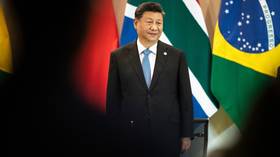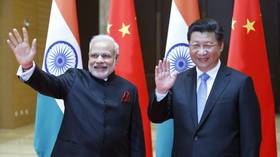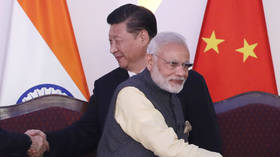Why India doesn’t want BRICS to dismantle the world order built by the West

A famous incident narrated by Bob Woodward in his book Obama’s Wars comes to mind: President Barack Obama, disregarding the protestations of Chinese protocol officials, burst into a closed-door meeting of Chinese, Indian and Brazilian leaders on a late Friday afternoon in Copenhagen, a week before Christmas in 2009, where the three BRIC leaders (this was before South Africa joined and the group became BRICS) were negotiating in secret a common position at the climate talks, which were on the verge of complete meltdown.
Obama had wanted the three leaders of the most powerful nations of the “Global South” – and South African President Jacob Zuma – to meet him individually rather than collectively, and was frantic that his ploy was upended. Eventually, Obama joined the four leaders and the negotiations resulted in a meaningful agreement.
That incident, just six months after the first BRIC Summit in Yekaterinburg in June of that year, underscored a cardinal truth that although the signs were there already that the West’s decline had begun, no one had any doubts that the United States and Europe would continue to determine the characteristics of the world economy and international politics for a long time.
Today, when India’s approach to the upcoming BRICS Summit has become a matter of some controversy – with Reuters even floating a mischievous rumor that Prime Minister Narendra Modi might not travel to Johannesburg – what is being overlooked is that there is a remarkable consistency in India’s conception of the grouping: that BRICS was a community of revisionist powers who were not seeking the destruction of the world order, but the inclusion of their interests in this order.
However, time didn’t stand still. Globalization is moribund and the system of international institutions that provided its underpinnings are no longer inclusive. In fact, Russia and China are under US sanctions. On the contrary, India’s relationship with the US is perhaps at its highest point in history – almost a quasi-alliance – and Washington describes it as the “defining partnership” of the century. Arguably, the US sanctions against China could even hold advantages for India. The close bonding between the two countries that is in the pipeline for the chip industry is a case in point. Suffice to say, life may even be getting better for India, and the country’s elite would see no reason to trade its modest revisionist wishes for a most fundamental restructuring of the existing international order, let alone its destruction.
The bottom line is that India is content if the influence of BRICS in the shaping of the main aspects of the global agenda can make the world more just and stable. Indeed, that is not a far-fetched dream, as BRICS is on the right side of history. None of the group’s members have their economic opportunities and political influence grounded in a history of bloody wars, conducted with the purpose of establishing regional and global dominance centered around the wealth accumulated over several centuries. India feels at home.
This brings us to the core issue of the attraction that BRICS holds for so many countries today that are so patently divergent in their national characteristics, values, and interests – from Indonesia to Iran, Egypt to Saudi Arabia – who tend to regard the grouping as if it is poised to pick up the banner of global governance from the West. Such expectations are irrational, as they are premised on the evolution of the entire international order in a certain predetermined direction, which is of course not the case.
Thus, it is only natural that Brazil – or India, for that matter – may feel troubled as to how, moving forward, BRICS’ contribution to global governance can truly be decisive. Fundamentally, there is uncertainty as to whether, in the current circumstances, it is even possible for BRICS to maintain the revisionist behavior of the past. The issue is not about the outcome of the Ukraine conflict, which Russia cannot and will not lose, but that even after a catastrophic defeat, its adversaries are highly unlikely to change their views on the world.
Therefore, if BRICS expands, devoid of norms, the unity of the grouping could get impaired, rendering it diffuse and ineffectual. That was what happened to the Non-Aligned Movement. Yet, this is also a transformative period where “The best lack all conviction, while the worst are full of passionate intensity,” to borrow Yeats’ anguished formulation of an eternal principle of politics.
The predicament is acute against the backdrop of the Ukraine conflict and the Biden administration’s dual containment strategy against China and Russia, two founding members of BRICS. Unsurprisingly, Chinese and Russian world views have dramatically changed in the most recent past and are robustly countering US hegemony. The “no limits” friendship between these neighboring giants sets them apart somewhat within BRICS, and that cannot but affect the alchemy of the grouping – although the collegial spirit continues, thanks to their pragmatism and sagacity.
Curiously, many of the aspirants who seek association with BRICS could even be getting attracted to the grouping principally for that reason – a sort of second pillar that upholds a more just and less selfish global governance in relation to the small and medium-sized states of the world.
Make no mistake that all the experience of strong institutions and global governance happens to be the experience of the West on the basis of common values and shared interests. Ironically, it also accounts for their “bloc mentality.” BRICS, on the contrary, lacks such cohesiveness and the capacity to set the world agenda, which the G7 had been doing for decades. That is why a country like India will always expect BRICS as a community to aim not at destroying the existing world order, but at changing it for the better. India does not want the collapse of globalization, institutions and international law. Put differently, India prefers to create within the existing order such rules, norms and ways of cooperation that would allow for the preservation of its advantages and the elimination of its shortcomings.
For India, this is both a matter of tactic and strategy. The prevailing rules-based order gives India a sense of security and strengthens multipolarity in Asia. It is a misconception that India is under pressure to bandwagon with the US. That might have been the case previously, but present-day India, under the current leadership in particular, is consciously expanding the relations with the US, which it considers to be in its own national interests. It is a logical outcome of the trajectory of politics in India since the 1990s and it enjoys a “bipartisan consensus” between the ruling party and the main opposition party. And it has become a long-term trend that already seems irreversible.
Several factors are involved here and one main factor is, paradoxically, the phenomenal rise of China, India’s BRICS partner, which raises alarmist sentiments in the country. The partnership with the US is one of the few ways India hopes to address the security paradigm. That said, India’s BRICS partners can and should trust India to continue to pursue an independent foreign policy based on its national interests. There is no reason to doubt that India reposes faith in the decisive influence of the BRICS in the shaping of the main aspects of the global agenda that will make the world more just and stable.
The statements, views and opinions expressed in this column are solely those of the author and do not necessarily represent those of RT.
















